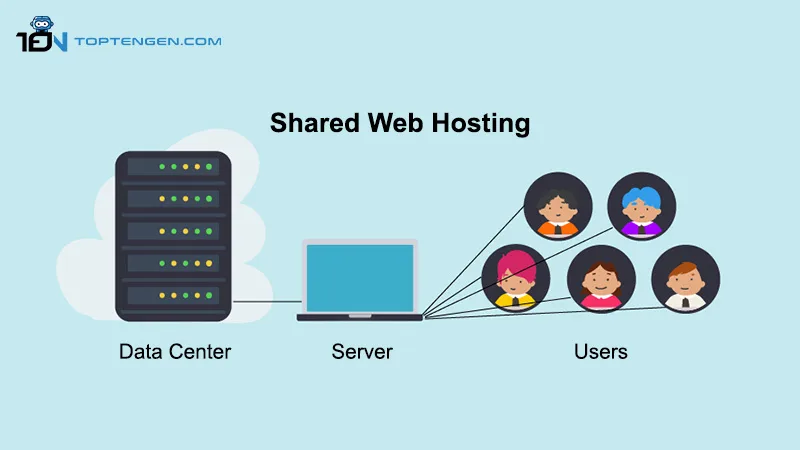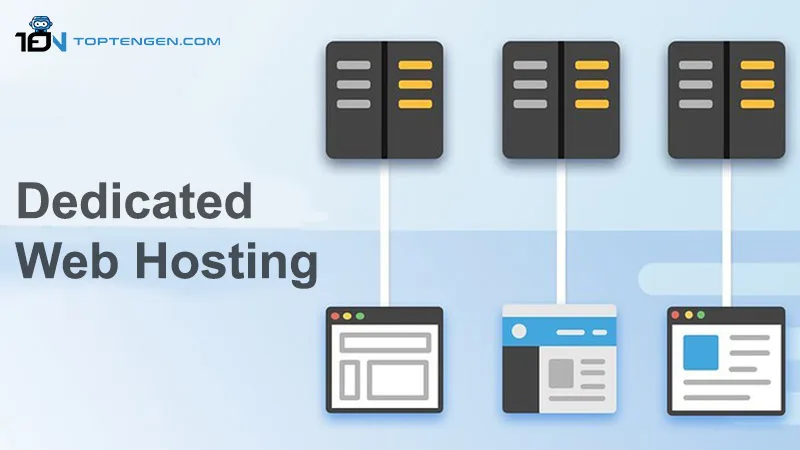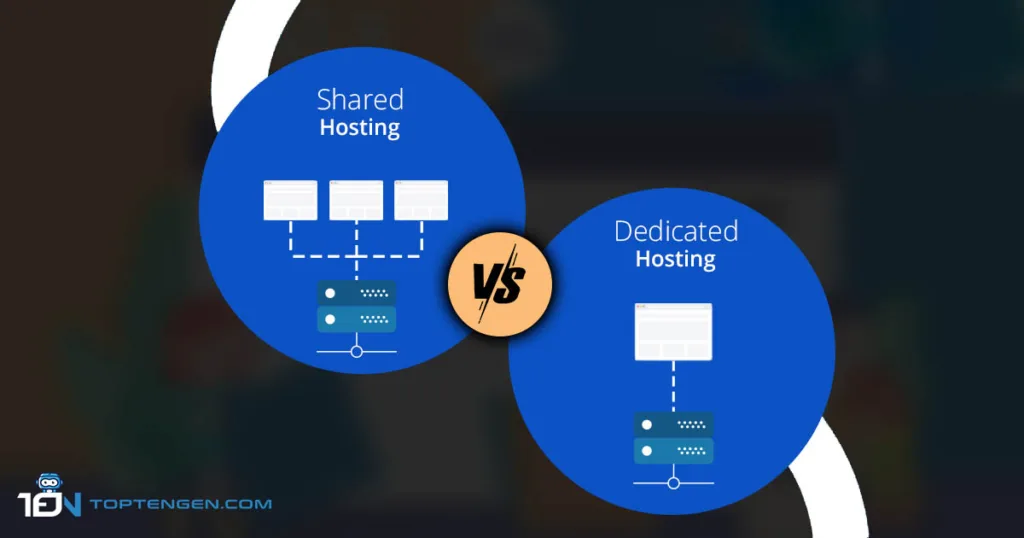Having a website is essential for any business, but determining the right hosting solution can be tricky. The two main hosting categories widely utilized are shared and dedicated hosting. If you make the appropriate choice based on your specific needs, it not only allows you to save costs but also helps in retaining customers.
The decision between Shared vs Dedicated Hosting requires careful consideration. To simplify this process. We have prepared a comprehensive guide to help you make a well-informed decision.
Shared Web Hosting

Shared hosting is a hosting service that involves multiple websites utilizing the same physical servers and resources. If you choose shared hosting, your website will share CPU, memory, storage and bandwidth with other websites hosted on the same server.
Shared Web Hosting: Pros and Cons
| Pros | Cons |
| Low cost | Shared use of server resources |
| No need for technical expertise | High security risks |
| Efficient use of technology | Growth limitations |
Who Uses Shared Hosting?
Shared hosting is the perfect option for website owners seeking a user and budget-friendly solution. It serves as an ideal match for personal projects, small businesses and even medium-sized enterprises, providing numerous benefits. As long as the website traffic remains moderate and the server has robust security protocols, any potential disadvantages of shared hosting become inconsequential.
Dedicated Web Hosting

Dedicated hosting means your website has its own server exclusively dedicated to you. There are no other websites sharing the server, ensuring all the servers are solely for your use. This hosting enhances your website performance and minimizes security risks.
Dedicated Web Hosting: Pros and Cons
| Pros | Cons |
| Ability to use full server resources | High cost |
| Full customization | Technical expertise required |
| Higher security |
Who Uses Dedicated Hosting?
Dedicated hosting is ideal for businesses that demands extensive bandwidth and have unique and specific requirements. Large companies with valuable data preferred to opt the dedicated hosting due to its higher level of security. It also provides most of its benefits to tech-savvy users who can leverage its customization option effectively.
Shared vs Dedicated Hosting | Benefits

Here is the comparison of shared vs dedicated hosting, highlighting their differences in various aspects.
Flexibility and Customizability
In the comparison of Shared vs Dedicated Hosting flexibility and Customizability is crucial factor. In shared hosting, customization is limited because any changes to the server’s backend would affect all the websites sharing that server. While some hosting plans may allow minor adjustments, like adding extra FTP users or cloud storage, significant personalization option are restricted. On the other hand, dedicated hosting offers complete customization. With exclusive excess to the server, you can choose your preferred operating system, optimize the bandwidth and memory according to your precise needs.
Reliability
When it comes to Shared vs Dedicated Hosting, Shared hosting plans are more likely to experience slowdowns, or downtime because of other websites on the same server using up a lot of resources or having coding issues. In contrast, dedicated hosting is a reliable option for businesses with sustainable website traffic.
Security
When it comes to security in Shared vs Dedicated Hosting, Shared hosting plans are more likely to face cyber-attacks compared to dedicated hosting. This is because the server is shared among multiple users that creates a greater chance for security breaches. It’s crucial to choose a reliable and trustworthy professional hosting company to ensure the server’s physical security. The company will take the necessary precautions to protect the server from any potential break-ins or damage.
Scalability
Scalability means how much traffic and data your website can manage. In Shared vs Dedicated Hosting comparison, Dedicated hosting is fully scalable, meaning that there is no limitation on your website activities. Shared hosting varies by provider. Some offer scalability, while others don’t. Nowadays many providers offer shared hosting with scalable bandwidth, allowing websites to handle as much traffic as they can attract. So, your shared hosting is scalable or not depends on the provider you choose.
Costing
If we talk about Shared vs Dedicated Hosting, Shared hosting is much cheaper than dedicated hosting. It costs around $1 to &20 dollar per month. If there are major problems with the servers on dedicated hosting, it may cost even more to fix. So, if you want to save money shared hosting is the better option.
Resources
When using a Shared server, you participate in resource sharing, including data, CPU time, memory, and disk space. Additional information about this can be found in our Acceptable Use Policy and Terms Of Service. All of our Shared servers are equipped with CloudLinux OS, which aids in resource allocation control. CloudLinux ensures that each client operates within a secure, isolated environment known as a Lightweight Virtual Environment (LVE). For more in-depth information about LVE, please refer to the provided resources. If you have a website that receives massive volume of traffic, Dedicated server is the best choice.
So, by this Shared vs Dedicated Hosting comparison, you can easily choose which one is best for you.
